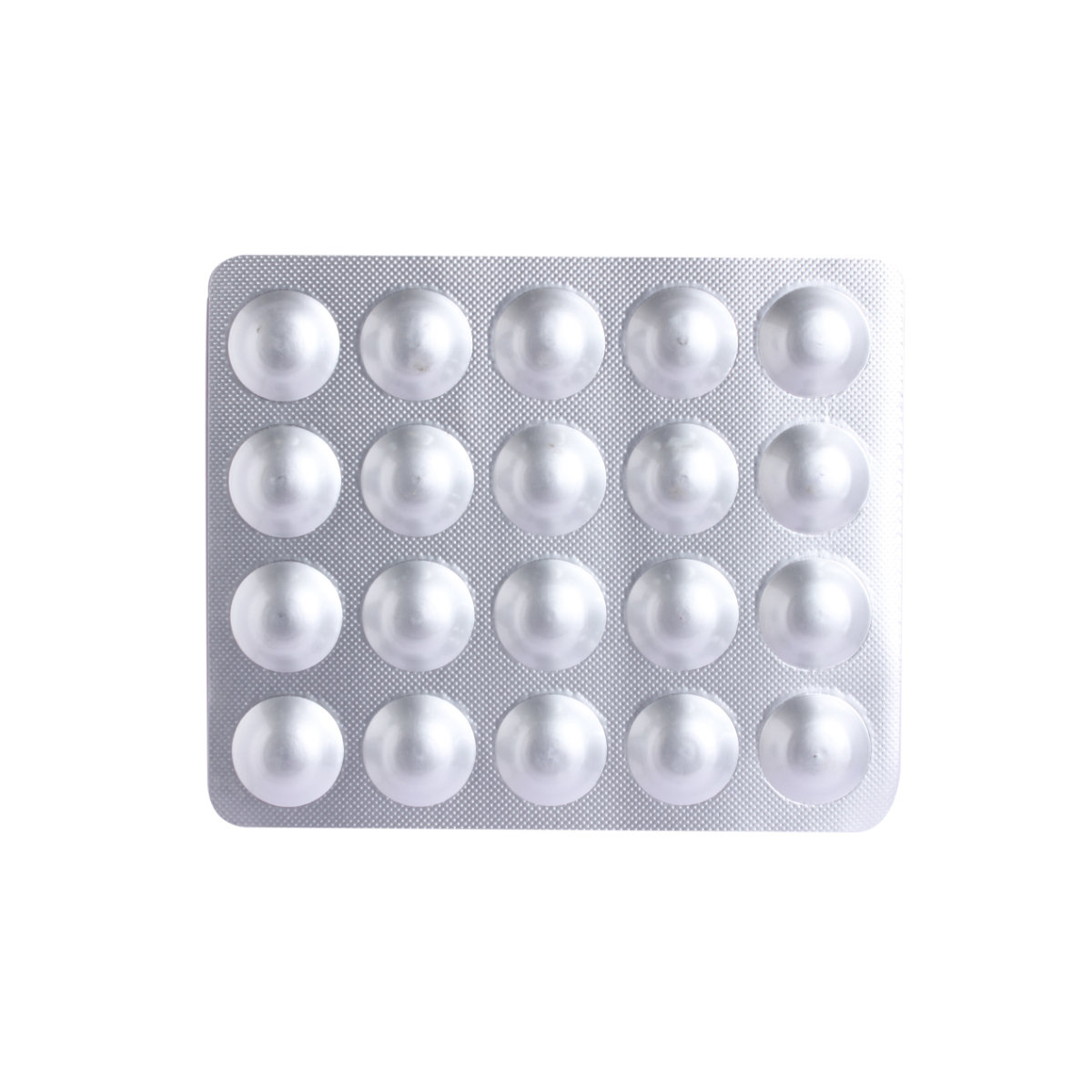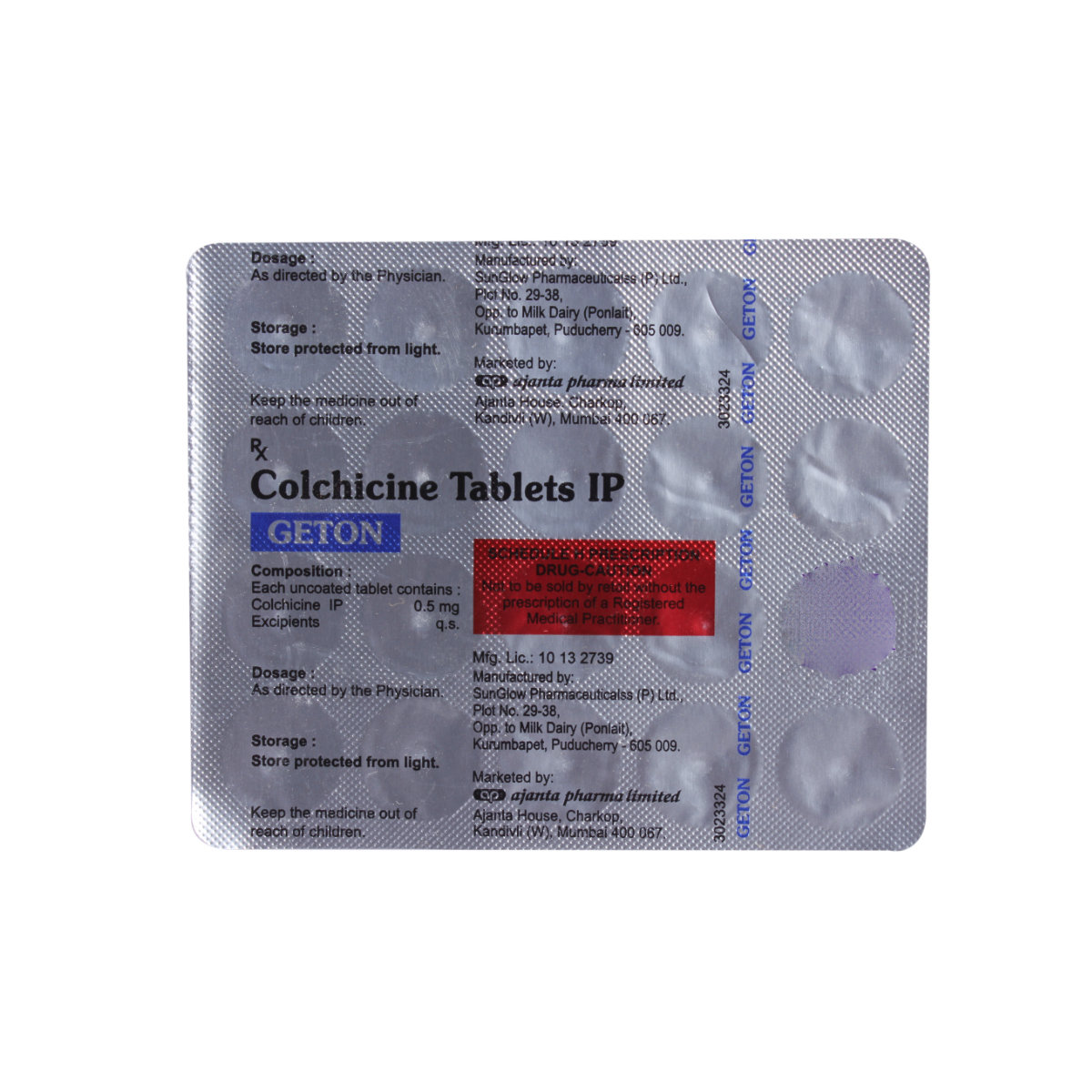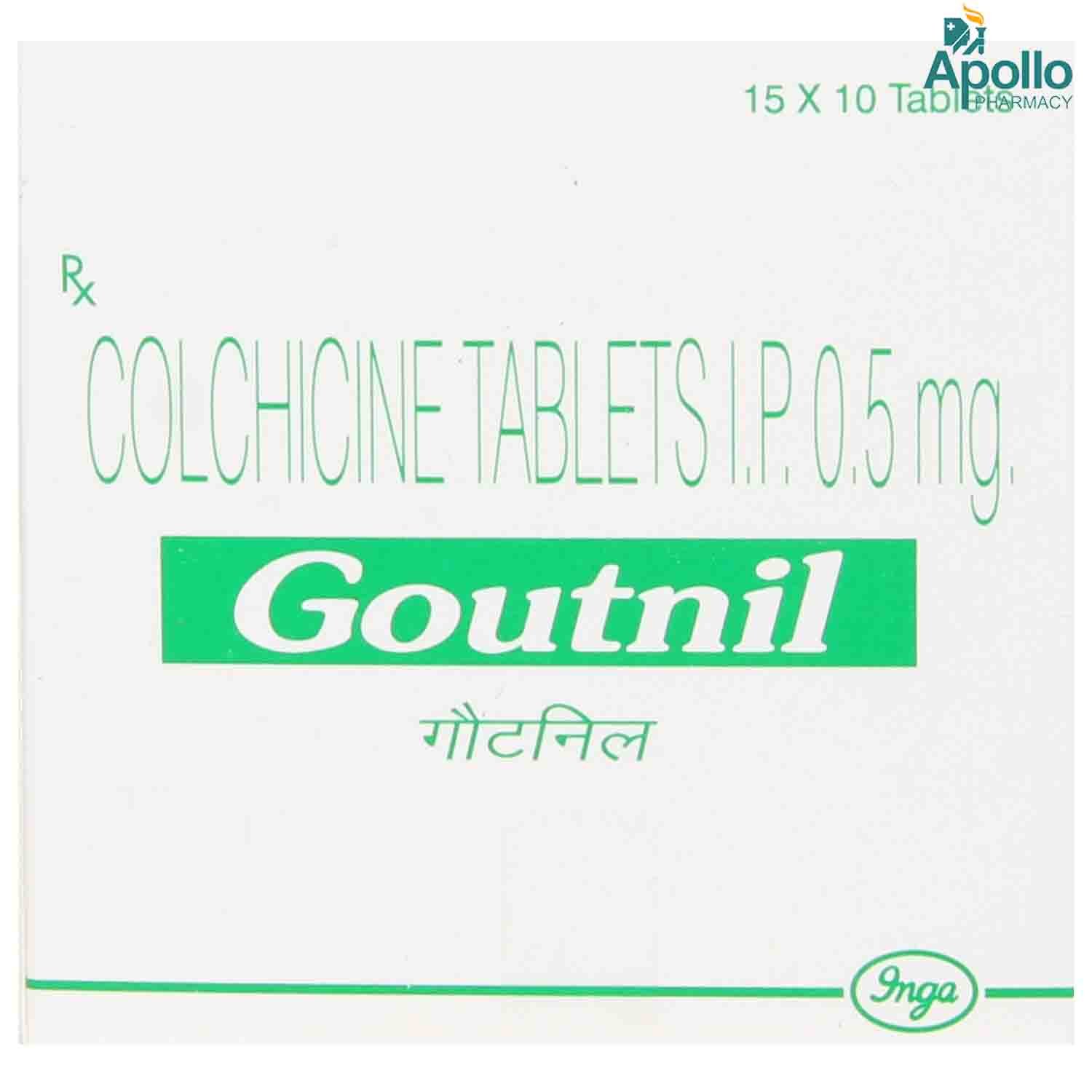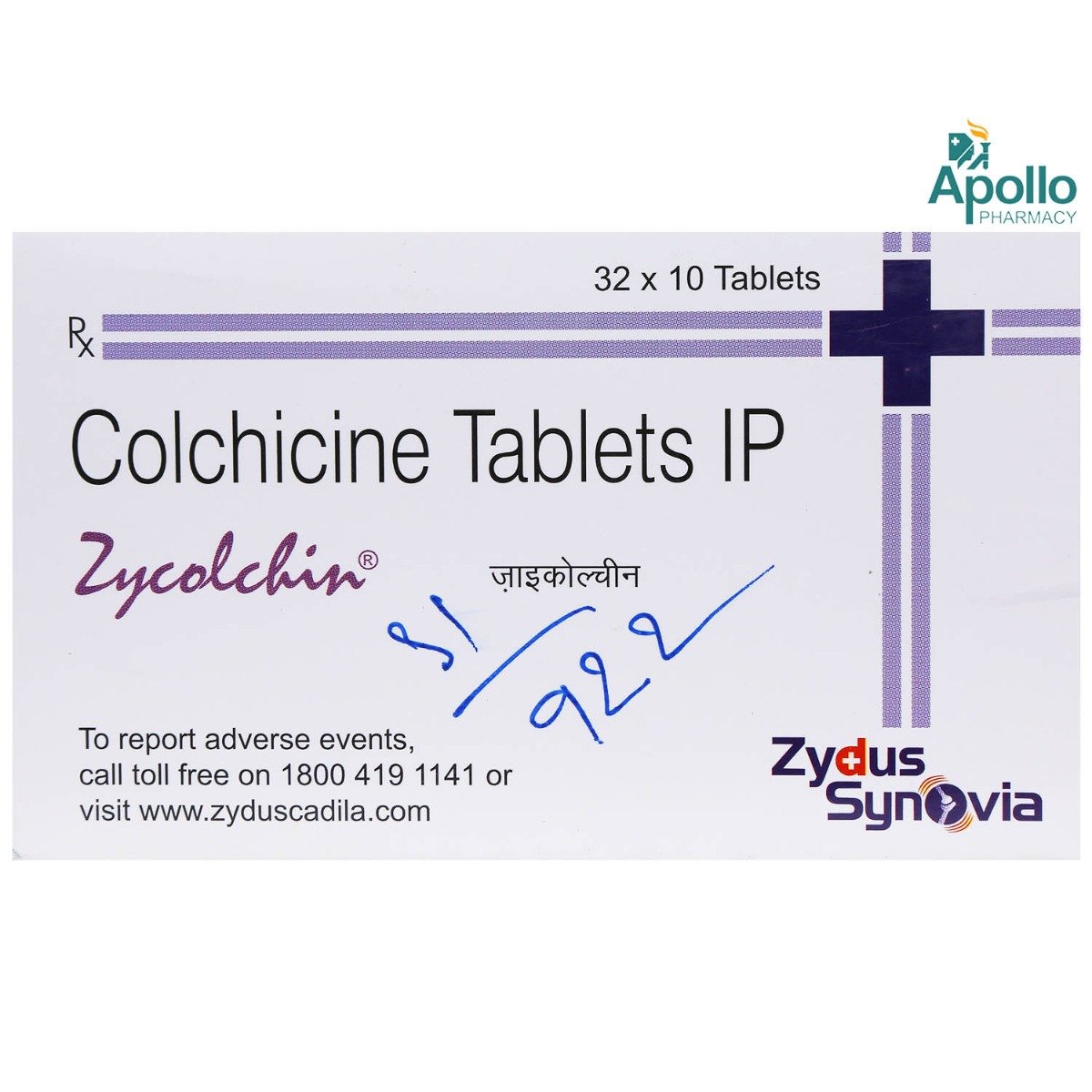Geton Tablet 20's
MRP ₹67
(Inclusive of all Taxes)
₹10.1 Cashback (15%)
Selected Pack Size:20
20 ₹60.3
(₹3.02 per unit)
Out of stock
15 ₹44.1
(₹2.94 per unit)
Out of stock
Provide Delivery Location
Online payment accepted
 Prescription drug
Prescription drugWhats That
Composition :
Manufacturer/Marketer :
Consume Type :
Expires on or after :
Return Policy :
NPPA :
About Geton Tablet
Geton Tablet is an anti-inflammatory agent and belongs to the class of anti-gout agents. It is used in the treatment and prevention of acute attacks or flare-ups of gout. Gout is a chronic condition that occurs due to the deposition of uric acid crystals in the joints. It is characterized by intense pain and swelling in the affected joints. Geton Tablet decreases pain, swelling, and inflammation. It also prevents sudden attacks of pain caused by acute gout.
Geton Tablet contains Colchicine. It works by reducing the inflammation caused by crystals of uric acid in your joints. This helps to reduce pain.
Use Geton Tablet as prescribed by your doctor. You may experience side effects such as diarrhoea, nausea, and vomiting. These effects gradually resolve over time. However, if the side effects persist, consult your doctor.
Inform your doctor if you are allergic to Geton Tablet or any other medicines. Pregnant and breastfeeding women should use Geton Tablet with proper consultation and caution. Keep your doctor informed about your health condition and all your medications before taking Geton Tablet to rule out any side effects. To treat your disease effectually, continue using Geton Tablet for as long as your doctor has prescribed it.
Uses of Geton Tablet
Directions for Use
Key Benefits
Geton Tablet has anti-inflammatory properties. It works by targeting white blood cells (neutrophils). It reduces the inflammation caused by uric acid crystals in the affected joints, thereby reducing pain, swelling, and inflammation.
Storage
Drug Warnings
Do not take Geton Tablet if you're allergic to any ingredient in it. Geton Tablet should not be used in patients with liver diseases as it increases the risk of muscle damage. It should be used cautiously in patients with kidney problems and blood disorders. Pregnant women, breastfeeding mothers, and children below 12 years should use only with a doctor's advice. Overdose of Geton Tablet may lead to abdominal pain, severe nausea, bloody stools, and dizziness.
Diet & Lifestyle Advise
- Maintain a healthy body weight because obesity can lead to joint pain. Please avoid strenuous exercise as it may aggravate your arthritis-related joint pain. Instead, you can stretch and engage in low-impact aerobic activities such as treadmill walking, biking, and swimming. Lifting light weights can also help to improve your muscle strength.
- Increase your intake of glucosamine, chondroitin sulphate, vitamin D, and calcium-rich supplements. Aside from that, turmeric and fish oils can help to reduce tissue inflammation.
- Include fish such as salmon, trout, tuna, and sardines in your diet if you have arthritis or joint pain. These fish are high in omega-3 fatty acids, which aid in the reduction of inflammation (redness and swelling) and the protection of the heart.
- Your sitting posture is critical, especially if you suffer from pain or inflammation. Try to sit as little as possible and only for a short period of time (10-15 min). Place a rolled-up towel at the back of your curve to alleviate pain. In addition, if necessary, a footrest can be used.
- Follow heat or cold therapy by regularly applying a cold or hot compress to the joints for 15-20 minutes.
- Relax by meditating, reading, enjoying a bubble bath, or listening to calming music.
- Avoid drinking alcohol and quit smoking.
Side Effects of Geton Tablet
- Nausea
- Vomiting
- Diarrhea
- Abdominal pain
- Fatigue
Habit Forming
Therapeutic Class
All Substitutes & Brand Comparisons
RX
Out of StockColchicindon 0.5mg Tablet
Zydus Cadila
₹12.29
(₹1.11 per unit)
63% CHEAPERRX
Out of StockColjoy 0.5mg Tablet
Cadila Pharmaceuticals Ltd
₹22.36
(₹2.01 per unit)
33% CHEAPERRX
Out of StockColchigout 0.5 Tablet 10's
Prevego Healthcare & Research Pvt Ltd
₹32.5
(₹2.93 per unit)
2% CHEAPER
FAQs
Drug-Drug Interactions Checker List
- CYCLOSPORINE
- CLARITHROMYCIN
- NEFAZODONE
- ATORVASTATIN
- DIGOXIN
- ROSUVASTATIN
- KETOCONAZOLE
- ITRACONAZOLE
- IBUPROFEN
- NAPROXEN
- DISULFIRAM
Disease/Condition Glossary
Gout is a type of arthritis in which patients experience severe pain, redness, and swelling in joints. The most common affected area is the joint at the base of the big toe. It occurs due to a condition called hyperuricemia (high uric acid levels in the body). The excess uric acid deposit and crystallize in the joints leading to pain and inflammation. Patients with gout may often experience acute attacks that result in sudden and severe pain.

Have a query?
Alcohol
Safe if prescribed
Alcohol may affect Geton Tablet effectiveness. So, people should avoid taking alcohol while using Geton Tablet .
Pregnancy
Consult your doctor
Please consult the doctor. Geton Tablet should be used in pregnant women only if clinically needed, and the benefits outweigh the risks.
Breast Feeding
Consult your doctor
Please consult the doctor. Geton Tablet should be used in nursing mothers only if clinically needed, and the benefits outweigh the risks.
Driving
Safe if prescribed
Geton Tablet will not affect your ability to drive or operate machinery. However, do not drive or operate machinery if you feel sleepy or dizzy after taking your medicine.
Liver
Consult your doctor
Geton Tablet may cause liver damage. So, it should be advised with caution in patients with liver diseases.
Kidney
Consult your doctor
Geton Tablet should be used with caution in patients with renal impairment. The doctor may adjust the dose depending on your condition.
Children
Safe if prescribed
Geton Tablet should be used in children below 12 years only when prescribed by a child specialist.










